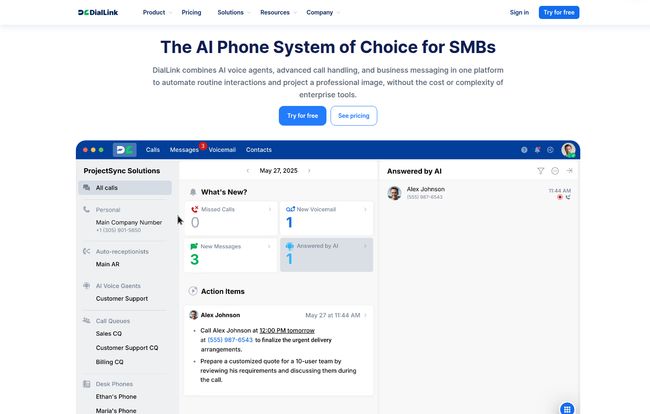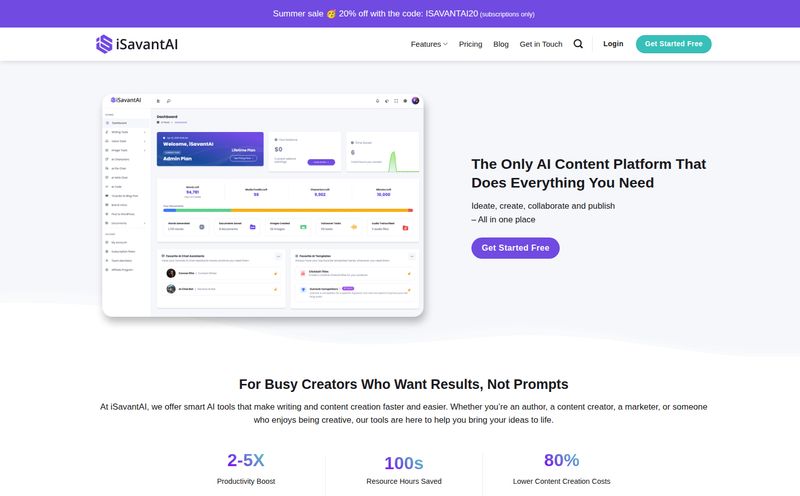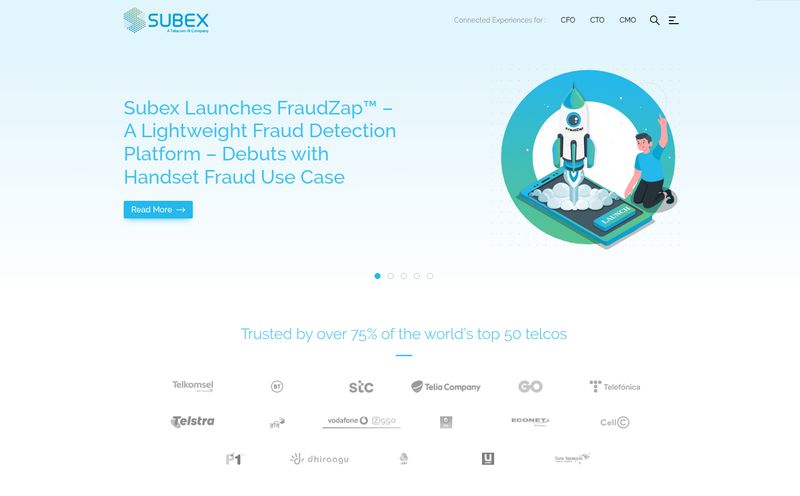As a small business owner, the sound of your phone ringing is a double-edged sword. On one hand, it’s the sweet sound of opportunity—a new lead, a customer with a question, a potential sale. On the other hand, it’s an interruption. A distraction. Another task on a to-do list that’s already a mile long.
I’ve been in the SEO and traffic generation game for years, and I’ve seen it time and time again with my clients. They're brilliant at what they do, but they spend half their day being a human answering machine. “What are your hours?” “Do you have this in stock?” “How do I book an appointment?” It’s death by a thousand paper cuts. Or, in this case, a thousand phone calls.
We’ve tried everything, haven't we? Complicated phone trees that nobody likes, hiring a receptionist which is expensive, or just sending everything to voicemail and hoping for the best. So when a tool like DialLink comes across my desk, claiming to use AI to solve this exact problem, my ears perk up. Is it just another piece of tech promising the world, or is this the real deal? I had to take a look.
So, What Exactly is DialLink?
At its core, DialLink is a cloud-based phone system. Think of it like other VoIP (Voice over Internet Protocol) services you might have heard of. It gives you a business phone number—local, toll-free, even international—that works through your internet connection, not a clunky old landline. You can make and take calls from your computer or a mobile app. Standard stuff for 2024.
But that’s where the similarities end. The kicker, the thing that makes DialLink a different beast altogether, is its layer of AI. It comes with AI Voice Agents designed to handle the routine, repetitive calls for you. It’s not just a fancy answering machine; it’s a system built to interact, understand, and act. A business phone system with a brain.
The Real Magic: Those AI Voice Agents
Okay, let's talk about these AI agents because this is the star of the show. Imagine you run a local service business, maybe a plumbing company or a hair salon. Your AI agent can be programmed to answer the most common questions automatically. It can book appointments directly into your calendar, qualify new leads by asking a few basic questions, or route a truly complex issue to a specific human team member.

Visit DialLink
This isn't about replacing your team; its about augmenting them. It’s like having a team of receptionists who never sleep, never take a lunch break, and never sound tired of answering “What time do you close?” for the tenth time that day. It frees up your actual human staff to focus on the high-value conversations—the ones that require empathy, complex problem-solving, and a genuine human connection.
I had a client, a small e-commerce shop, who was drowning in calls about order status. We set up a system (a clunky one, I admit) to try and automate it, but it was a mess. A tool like DialLink could, in theory, handle 90% of those calls, integrating with their systems to give real-time updates. That’s not just saving time; that’s improving the customer experience ten-fold.
More Than Just a Smart Robot
While the AI is flashy, a tool is only as good as its foundation. I was relieved to see that DialLink is a fully-featured cloud phone system underneath all the smarts. You get all the features a growing business needs:
- The Essentials: Call forwarding, call waiting, call recording, and voicemail with transcription (a personal favorite, I hate listening to long voicemails).
- Team Collaboration: You can have multiple users and extensions, set up ring groups (so a call can ring multiple people at once), and see who's on a call.
- Professional Touch: Get local and toll-free numbers to establish a professional presence. You can even port your existing business number over, so you don’t have to change a thing on your marketing materials.
- Accessibility: Works on your computer, a mobile app (iOS & Android), and even supports traditional desk phones if you’re old school like that.
So, you’re not sacrificing a professional phone setup just to get some cool AI features. You get both. It’s a complete package, which I appreciate. Nothing worse than a tool that only solves half the problem.
How It Plays With Your Other Tools
For me, this is a huge one. A tool that lives on an island is a useless tool. DialLink seems to get this. Their integrations list is solid and focused on tools that small businesses actually use. We’re talking Zapier, which is the holy grail for connecting pretty much anything to anything else. But there are also direct integrations with things like:
- CRMs and Helpdesks: Zendesk is a big one for support teams.
- Productivity: Slack, Gmail, Office 365. Imagine getting call summaries posted directly to a Slack channel. Chef's kiss.
- Marketing & Sales: Mailchimp and even Stripe. The Stripe integration is interesting; you could potentially tag calls related to payment issues automatically.
This is what turns a phone system from a utility into a part of your growth engine. When your phone talks to your other software, you start building a much smarter, more efficient business.
The Big Question: What's the Price Tag?
Alright, let's get down to brass tacks. The technology is cool, but can a small business afford it? DialLink’s pricing is pretty transparent, which is a good start. They operate on a per-user, per-month basis, with discounts for paying annually. Here's a quick breakdown I put together from their pricing page:
| Plan | Annual Price (per user/mo) | Monthly Price (per user/mo) | Best For |
|---|---|---|---|
| Essential | $18 | $25 | Startups and small teams needing the core phone system. |
| Professional | $25 | $35 | Growing businesses needing integrations and AI features. |
| Enterprise | $40 | $50 | Larger teams needing advanced features and unlimited AI. |
Note: The AI features like text-to-speech generation and AI call summaries really kick in at the Professional plan.
There's also a "Contact Center Add-on" for $40 a month, which seems to add more heavy-duty features like automatic callback. You also have to factor in metered rates for things like going over your included minutes or for international calls. This is standard for the industry, but something to keep an eye on. Overall, the pricing feels competitive for what's on offer, especially if the AI can save you from hiring another part-time employee.
My Unfiltered Opinion on DialLink
So, what’s my final take? I’m cautiously optimistic. I’ve seen enough marketing fluff to be a natural skeptic, but the approach here feels right.
The Wins: The core idea of blending a solid VoIP with practical AI is brilliant. For service-based SMBs, this could be a genuine game changer. The ease of use and setup they're touting is a massive plus, and the integrations show they understand how modern businesses work. Its a powerful combination.
The Watch-Outs: Let's be clear, AI isn’t magic. You'll still need to monitor it, especially at first, to make sure it's understanding and responding correctly. You're the one who has to train it. Also, as with any cloud service, it relies on a stable internet connection. No internet, no phone. Finally, while the base price is reasonable, you need to be mindful of those metered rates if you're a high-volume call center.
Your DialLink Questions, Answered
Is DialLink good for solo entrepreneurs?
Yes, absolutely. The Essential plan is priced for a single user, and the automation can make a one-person-show seem like a much larger operation. It can handle calls while you're busy doing the actual work.
How good is the AI voice agent, really?
This is the million-dollar question. Based on what they're showing, it seems designed for structured, common queries. It's not going to have a philosophical debate, but it should be very effective at things like scheduling, answering FAQs, and routing calls. The quality will depend on how well you set it up.
Can I keep my current business number?
Yes, the platform supports number porting. This is a crucial feature, and it means you can switch to DialLink without confusing your existing customers.
Do I need a physical desk phone?
Nope. You can run the whole system from your computer (using a headset) or the mobile app on your smartphone. They do support IP desk phones if you want one, though.
What happens if I go over my plan's minutes?
You’ll be charged a per-minute rate for overages. The rates are listed on their pricing page and are pretty standard for the industry. For example, it's $0.018 per minute for calls within the US & Canada once you've used your plan's included minutes.
Is DialLink Worth It for Your Business?
After looking it all over, I think DialLink is a really compelling option for a specific type of business: the modern SMB or startup that's service-heavy and tired of being tied to the phone. If you or your team are losing productive hours to repetitive calls, the ROI on a tool like this could be massive.
It’s an intelligent, modern solution to an age-old business problem. It won't be the perfect fit for everyone, but for those it’s designed for, it could be the breath of fresh air they've been waiting for. It’s definitely a platform I'll be keeping a close eye on and recommending to clients who fit the bill.



